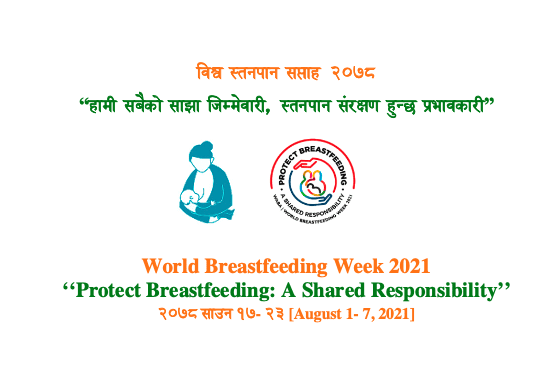The World Breastfeeding Week (WBW) is a global campaign to raise awareness and galvanise action on themes related to breastfeeding. WBW is celebrated every 1-7 August in commemoration of the 1990 Innocenti Declaration. WBW started in 1992, with annual themes including healthcare systems, women and work, the International Code of Marketing of Breastmilk Substitutes, community support, ecology, economy, science, education and human rights. Since 2016, WBW is aligned with the Sustainable Development Goals (SDGs). In 2018, a World Health Assembly resolution endorsed WBW as an important breastfeeding promotion strategy.

Vision
To achieve a world where breastfeeding is the cultural norm, where mothers and families are enabled to feed and care optimally for their infants and young children thus contributing to a just and healthy society.
Goal
To foster a strong and cohesive breastfeeding movement, which will act on the various international instruments to create an enabling environment for mothers, thus contributing to increasing optimal breastfeeding and infant and young child feeding practices.
Objectives
- Inform people about the importance of protecting breastfeeding
- Anchor breastfeeding support as a vital public health responsibility
- Engage with individuals and organisations for greater impact
- Galvanise action on protecting breastfeeding to improve public health
Mother’s Milk Substitutes (Control of Sale and Distribution) Act, 2049 (1992)
World Breastfeeding Week 2021: Protect Breastfeeding: A Shared Responsibility
#WBW2021 will focus on how breastfeeding contributes to the survival, health and wellbeing of all, and the imperative to protect breastfeeding worldwide. The theme is aligned with thematic area 2 of the WBW-SDG 2030 campaign which highlights the links between breastfeeding and survival, health and wellbeing of women, children and nations.
#WBW2021 #WABA
#ProtectBreastfeeding
#SharedResponsibility
#breastfeeding
#SDGs
#worldbreastfeedingweek2021
#ProtectBreastfeedingaSharedResponsibility
#protectbreastfeedingtogether
#buildingbackbetter
#warmchain4breastfeeding
#breastfeeding4publichealth
- Breastfeeding Fact Sheet: Nepal
- Mother’s Milk Substitutes (Control of Sale and Distribution) Act, 2049 (1992)
- World Breastfeeding Week 2020 Message
- World Breastfeeding Week: ”Empower Parents, Enable Breastfeeding”
- Breastfeeding: Foundation of life! World Breastfeeding Week 2018
- ”Sustaining Breastfeeding Together”-25th World Breastfeeding Week
- Sustaining Breastfeeding Together: WABA | World Breastfeeding Week 2017
- World Breastfeeding Week (1–7 August 2012)
- International days, weeks and years of Public Health Concern
- Activities to protect, promote and support of breastfeeding
- 10 facts on breastfeeding
- Breastfeeding provides the strongest foundation for lifelong health and optimal nutrition
- Ten Steps to Successful Breastfeeding
- Breastfeeding: A smart investment
- Key Indicators: The Nepal Demographic and Health Survey (1996 NDHS- 2016 NDHS)
- Key findings – The 2015 Nepal Health Facility Survey (2015 NHFS)
Do you have a website? Looking for the best hosting provider? Here’s a discount code.
Latest Public Health Jobs
Latest Posts
- Call for Application for a PhD Fellowship (NHEA/ University of Bergen)
- Nepal Multiple Indicator Cluster Survey 2024-25
- Multisectoral Action Plan for the Prevention and Control of NCDs, 2026-2030 (Draft)
- National Standard Operating Procedure for Early Warning, Alert and Response System (EWARS), 2025
- Priority Infectious Diseases for Community-Based Surveillance in Nepal
Thanks for visiting us.
Disclaimer: The resources, documents, guidelines, and information on this blog have been collected from various sources and are intended for informational purposes only. Information published on or through this website and affiliated social media channels does not represent the intention, plan, or strategies of an organization that the initiator is associated with in a professional or personal capacity, unless explicitly indicated.
If you have any complaints, information, or suggestions about the content published on Public Health Update, please feel free to contact us at blog.publichealthupdate@gmail.com.
#StayUpdated


